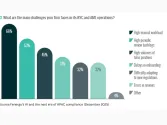
Retailers offset volume sale reduction through omnichannel approach
Singapore ranks as the most suited Asian economy for e-commerce.
Around half of retailers adopting a unified commerce or omnichannel approach saw their total number of transactions remain consistent during the pandemic, according to data from global payments platform Adyen.
The approach is said to have offset the reduction in sales volumes from closing physical stores through increases on other channels.
Adyen’s data also found that shoppers who only ever purchased from a retailer in-store prior to the pandemic spent 40% more on average when they shifted online to make purchases during the pandemic.
The importance of unified commerce to the performance of Singapore’s retail sector is further demonstrated in economic analysis commissioned by Adyen and conducted by the Centre for Economic and Business Research (CEBR).
CEBR’s research found a strong relationship between unified commerce and global retail sector resilience during the lockdown. Economies which rank higher on the UNCTAD Index, measuring each country’s preparedness for unified commerce, saw a more resilient retail sector during the lockdown period.
Singapore scored highly on the index, ranking as the most suited Asian economy for e-commerce and the third most suited economy globally with a score of 95.1.
When controlling for the stringency of country lockdowns, Cebr found that a five-point increase on the UNCTAD index was associated with 2.6% better retail sector performance during the pandemic. In Singapore this equates to a more than $330m improvement in turnover during the pandemic.
The research also showed that the proportion of total retail sales stemming from online channels amounted to 18.1% in June. This was more than triple the figures seen prior to the pandemic, showing just how quickly consumers have been able to shift their spending behaviour online in the absence of more typical expenditure channels.



















 Advertise
Advertise






